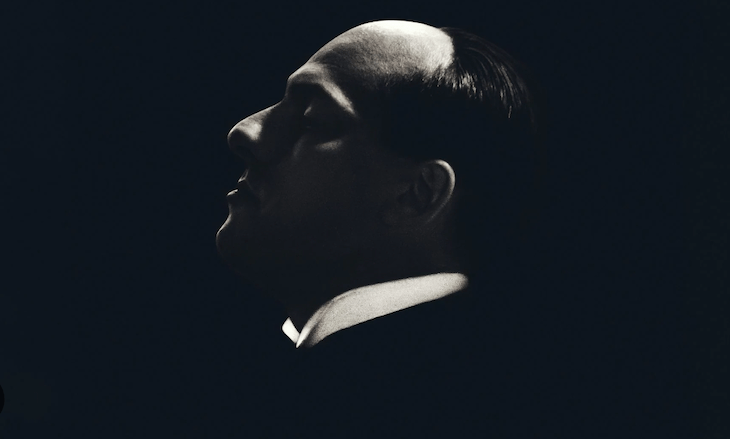Sky Atlantic’s eight-part biopic, Mussolini: Son of the Century, is a great missed opportunity to tell the truth about fascism. Director Joe Wright could have told us something truly instructive about Benito Mussolini, the rebel from the foothills of the Apennines who invented fascism. Sadly, he has not.
The series fails to explain to viewers the main reason why Mussolini was able to seize power so easily and relatively bloodlessly in 1922: many Italian people, sick of a paralysed democracy, wanted fascism. That is why Italy’s fascists, compared to the Nazis and the Soviets, killed far fewer political opponents. But Wright would have you believe that all that counted was fascist blackshirt violence.
Another big flaw in the series is the failure to explore the significance of the fact that Margherita Sarfatti, Mussolini’s mistress, muse and mentor until the late 1920s, was Jewish. This isn’t the fault of the actress Barbara Chichiarelli, who brilliantly captures the animal passion the real Sarfatti felt for her uncouth lover from the Romagnol Apennines. She was from a wealthy Venetian family and called him her “savage”. But the programme leaves unanswered a vital question: how could the inventor of fascism have a love affair with a Jewish women that lasted nearly two decades?
The simple answer, which you wouldn’t know from the programme, is that there were key differences between Italian and German fascism. The affair between Mussolini and Sarfatti shows that Italian fascism, unlike the Nazi version, was not originally anti-Semitic. Indeed, Italian Jews numbered among Mussolini’s supporters. It became anti-Semitic only after Mussolini’s fatal alliance with Adolf Hitler in the late 1930s. This is potentially fascinating territory to explore. But Wright ducked it.
Okay, Wright makes Sarfatti a crucial protagonist and has her telling Mussolini at one point: “I created you”. But he fails utterly to address the implications of this affair. That she is Jewish is mentioned only in passing, as if it is neither here nor there.
Let’s just try to get our heads round this. A Jewish woman created Mussolini? Wow! Surely that is worth investigating, is it not? Wright doesn’t appear to think so.
This, perhaps, is hardly surprising, as the series is based on volume I of a three-part novel by a nauseatingly smug knee-jerk-left Italian writer, Antonio Scurati, about Mussolini’s invention of fascism in 1919, his near bloodless seizure of power in 1922, and his imposition of dictatorship in 1925.
A century later, all this has huge relevance. The resurgence across Europe and America of, for want of a better term, “the right”, has resulted in the “fascist” label being chucked around about all and sundry like poisoned confetti. But while Mussolini: Son of the Century might have taught us something about the true meaning and origin of this word, it doesn’t.
Mussolini was the rising star of Italy’s revolutionary socialist party and editor of its newspaper Avanti! when, in 1914, he refused to accept the party line that Italy must remain neutral in the First World War. Instead, he insisted, Italy should fight with Britain and France against Germany and Austria. As a result, the party expelled him.
Dutifully, Wright gives us the scene at the Milan meeting of the socialist party at which Mussolini is kicked out of the party, complete with extracts from the actual speech itself:
“You hate me because you still love me,” Mussolini says. “You still love me because I am and will remain a socialist…No one can change their soul…Socialism is rooted in the blood.”
Bravo! But Wright doesn’t explain the significance of socialism being rooted in Mussolini’s blood, and why he made this decision which would have such monumental consequences for the 20th Century. Instead, viewers are left to think Mussolini was simply a violent war-mongerer.
There were key differences between Italian and German fascism
In 1919, Mussolini founded fascism as an alternative left-wing revolutionary movement to socialism (which itself would increasingly be known as communism). He would remain, he would claim, a socialist to the bitter end.
Indeed, in the dying days of the Second World War, he would call his new puppet regime in the north of Italy, the Italian Social Republic. In April 1945, when captured and executed by partisans on Lake Como while attempting to flee north to Switzerland, he was with Nicola Bombacci, a founder of Italy’s communist party, who had become his confidant. Bombacci’s last words before the partisan firing squad opened fire were: “Viva Mussolini! Viva il Socialismo!”
What Mussolini had tried to do was to transform the international socialism of orthodox Marxism into national socialism, which he called fascism. He did this because the First World War in which he had fought made him realise people are more loyal to their country than their class.
The fascist class war was not between rich and poor, as was the Marxist one, but between perceived ‘parasites’ of whatever class and producers of whatever class – and between those who had fought in the war, and those who had not.
True, he did not propose to abolish private property. But he did want the State to manage the means of production. So the fascist revolution was not a bourgeois counter-revolution at all. At the time, the rich, obviously, saw fascism as the lesser of two evils. Winston Churchill, who met Mussolini for the one and only time in 1927 in Italy, told the press that it was ‘quite absurd to suggest that the Italian government does not stand upon a popular basis or that it is not upheld by the active and practical assent of the great masses’.
Referring to Mussolini he added: “If I had been an Italian, I am sure I should have been wholeheartedly with you from start to finish in your triumphant struggle against the bestial appetites and passions of Leninism. But in England we have not yet had to face this danger in the same deadly form.”
Churchill would later still describe Mussolini as “the Roman genius” before becoming his enemy after the fascist dictator nailed his destiny to that of Hitler in the late 1930s.
There is little sense of this in Wright’s Mussolini biopic
There is little sense of this in Wright’s Mussolini biopic. It leans instead on the conformist line that Mussolini only came to power because he created a private army of blackshirts that beat up his opponents. In other words, you are led to think, the fascists came to power, not as a result of their ideas, but only of their violence.
The truth is that, in the wake of the 1917 Russian Revolution, across Europe the threat of socialist revolution was real, especially in Italy. But it was not just the rich who opposed the revolution. Huge numbers of Italians across the social divide were furious at the constant occupations of factories and farms and endless strikes caused by the socialists and the failure of successive inept governments to get the police and armed forces to do anything about it.
Mussolini’s blackshirts stepped into the vacuum. Yet this story is not properly told by Wright. Instead, we get endless scenes of blackshirt violence against socialists as if the socialists who wanted Soviet-style revolution were the good guys. Lenin himself once said that Italy’s socialists should never have got rid of Mussolini. How right he was.
A different TV series about the Jewish woman who was the mistress and creator of the man who invented fascism as an alternative left-wing revolutionary movement…Now that really would be one heck of a story. It would also be true.








Comments